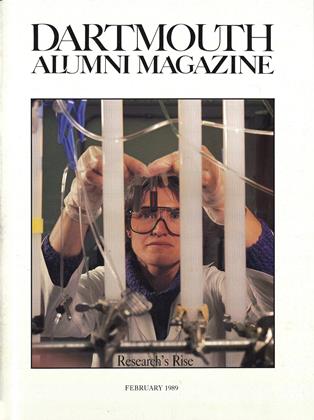One of the best ways to combine business with pleasure in the North Country is to become a tribologist. Dartmouth's tribologists scientists who study friction are working with Rossignol skis "to better understand what will make skis go fast," says Engineering Professor Francis Kennedy, who is working on the project with Thayer graduate student Guy Warren and Adjunct Professor of Engineering Samuel Colbeck.
The Thayer group isn't out to invent a better ski although someone might do just that based on their research. The tool of the trade is a downhill ski fitted with thermocoupies. Once the ski passes over snow, the researchers perform a microscopic analysis of snow and study heat transfer. A moving ski melts snow, which acts as a lubricant and allows the ski to go faster. On the other hand, too much melting "such as one might find on a warm March afternoon," notes Kennedy actually creates more friction and slows the ski.
The team's work is not all downhill. Although some research is done on the slopes, most of the investigation is done in Dartmouth's ice research lab and the army's CRREL lab in Hanover.
In search of the perfect ski, Thayer scientists study friction.
 View Full Issue
View Full Issue
More From This Issue
-
 Cover Story
Cover StoryThe Rise of Research
February 1989 By Anne Bagamery '78 -
 Feature
FeatureGeorge's College
February 1989 By Constance E. Putnam -
 Feature
FeatureA Story of Drama, Fierce Competition, Mom and Apple Pie
February 1989 By George Canizares -
 Article
ArticleREVIEW STUDENTS ARE BACK
February 1989 -
 Class Notes
Class Notes1988
February 1989 By Chuck Young -
 Article
ArticleThe Battle Against AIDS
February 1989 By Martha Hennessey '76







